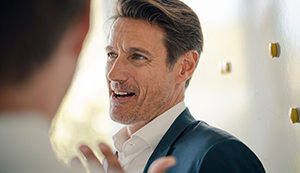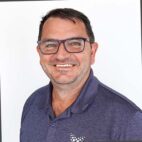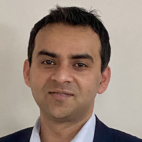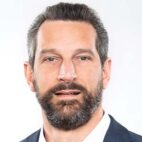In this inspiring episode of the SAPinsider Las Vegas 2025 podcast, host Robert Holland speaks with keynote speaker Hein Wagner—an adventurer, technologist, and motivational speaker. Born blind, Wagner shares how he turned what many see as a limitation into a life filled with purpose, exploration, and empowerment. From a career in IT to running marathons on every continent, including Antarctica, Wagner channels his experiences into motivational talks that encourage others to transform obstacles into opportunities. He discusses his passion for education and technology, including founding an academy in South Africa for blind adults, where students now train in fields like cybersecurity and gain employment in major sectors. Wagner also reflects on how AI technology, such as image-description apps, enriches his everyday life and work. He closes by sharing the three guiding principles that illuminate his path—appreciation, trust, and giving—offering a powerful reminder of the potential in every human experience.
LV Podcast_HeinWagner
0:00
Hello, I'm Robert Holland, and this is the SAP Insider Las Vegas 2025 podcast.
0:06
Thank you for listening as we speak with SAP insiders and industry experts about their experiences.
0:13
In this episode, I'm speaking with our keynote speaker from today, Heinet Wagner Hein.
0:19
Tell us a little bit about yourself and what you do.
0:22
Thanks, Robert.
0:23
Yeah, being very, very nice to be here at the at the Expert this afternoon.
0:28
I yeah, interesting.
0:29
I was, I was born blind, spend my half my career working in IT and for the last 20 years I've been travelling the world inspiring people to turn obstacles into opportunities because I guess that is exactly what I did with my blindness.
0:49
It ended up a very unexpected career transitioning from IT to the speaking business.
0:54
But you know, having fun with that absolutely everyday.
0:59
Yeah, I'd have to say that probably a good number of people in the IT business probably aren't eager to get up in front of audiences and, and talk about their experiences.
1:08
Yeah, it was, it was rather intimidating and and initially, but I, I guess what helps me is I can't see people, you know, so it's a bit, it's a little less intimidating, but I guess 2000 people this morning are, you know, you do the butterflies certainly come and you feel a little rattled.
1:23
But, you know, once you get into it, it gets better.
1:25
No, I absolutely I agree.
1:27
I mean, you know, it, it must be a little bit easier, as you said, because you can't see if it's fifty people or 2000 people, but you must be able to feel.
1:35
Oh, for sure.
1:36
No, absolutely.
1:37
I mean, I, I, I, I mostly, you know, work on the energy of my audience, you know, and you can immediately feel like I and you're doing something that's maybe not working as well or, or the other way, you know, So no, plays a huge role, you know, So reading the audience, feeling the room.
1:51
And sometimes actually, you know, working with 20-30 people in a sales or leadership leadership context is is harder than than because there's a there's a general energy when there's 2000 people in the room, you know, so it's a sort of mass energy that that just it keeps going.
2:07
Yeah, absolutely.
2:08
And it could be sort of infectious across the for sure, for sure.
2:11
Whereas sometimes, yeah, you're in a room with 10 people and get in to say anything is almost impossible.
2:17
Very true.
2:18
So I mean, you talked about the fact that you've been blind since birth.
2:21
So you've been facing and overcoming challenges in your life since since you were born, basically.
2:27
So tell us and our audience here a little bit about your life.
2:32
Sure.
2:32
So, so I, you know, although I was born blind, I, I didn't know that I was blind.
2:39
I already sort of found it out when society pointed it out to me.
2:44
And I can't seem exactly when it was probably in my preteens, you know, that I realised that, OK, I'm, I'm a little different.
2:49
And when I found out that I'm blind, I developed this obsession to see and I had no idea how I'm going to see.
2:59
And I, but more important was what, what did I want to see?
3:03
I absolutely wanted to see everything.
3:06
And I guess since I set that goal as a 7 or 8 year old, it became sort of my life's, not quite my mantra, But everything I did was linked to some kind of an adventure or experience because I wanted to see the world and what better way to do it, to go run a marathon in Hong Kong or New York or even Antarctica.
3:26
So I ended up doing a lot of adventures, but the motivation was really like, well, you know, I can do the, I don't have to, to go to New York to experience.
3:35
I can go onto YouTube and listen to or even listen to a podcast about New York.
3:39
But what is the best way for me to do it?
3:41
Well, it's to go walk the streets.
3:43
What a better way to go run the streets, to run the New York Marathon, get a great feel of the whole city.
3:48
So yeah.
3:49
And I, I am.
3:50
And then, you know, whilst I was working in IT, continue with my adventures.
3:55
And that's how I ended up in the speaking business because a principal at the local school asked me to say, hey, would you come talk to the kids?
4:02
It's about your experience, how the way that you see the world.
4:06
And it's always been from a slightly different perspective.
4:09
And you know, there's so much more to see for sure.
4:13
Yeah, I mean, it really sort of sounds like you've leveraged and taken every opportunity that you that sort of been out there to, to get out there and do more, I guess, you know, but but I'll be honestly, the the first half of my life, it wasn't that easy.
4:32
Yeah, I was, I was not, I was fighting this blindness thing.
4:35
I was obviously trying to change it.
4:37
You know, I was not just taking it and accepting it.
4:40
But I always say I used to be blind.
4:42
Now I'm only blinded by possibilities.
4:44
And and I spent a lot of energy in my in my teenage years fighting this thing.
4:49
And the, the minute that I started pushing the same energy into a different direction, it just, this whole opportunity just emerges.
4:57
Yeah.
4:57
And I think I think that that that's, that's really interesting that you sort of say you're simply now blinded by possibilities and you know, you've you've you're positioning the question differently, as it were.
5:11
Definitely.
5:12
Yeah.
5:12
No, it's, it's, it's certainly turned on a lot of light in my life by changing my perspective on that.
5:17
Yeah.
5:18
No, that's super interesting.
5:19
Now you've talked about your background in IT, but I know also that you've been very involved, I mean, you know, getting up and speaking to people and as you said, doing various other sessions.
5:31
But education in general has also been one of your passions.
5:36
Well, The thing is, I, I, I realised back at school that that the, the bridge that I have to walk over to become independent is basically held up by two pillars and that being education and technology.
5:48
And I, I, I fell in love with, with, with probably tech more than education, but I realised it too goes hand in hand.
5:53
So, so when I left school, I, I was just going to work in IT no matter what it takes.
5:57
And at the time, 35 years ago, there were not so many blind people working in ITI mean, we, the, the, today it's a whole different story.
6:05
I mean, if you look where technology is gone and where accessibility, etcetera.
6:08
I mean, all, all, most wearables like whether to watch is accessible today.
6:14
I mean, in my adventure sport, I can now see my heart rate on my, on my watch, you know, and, and all the other statistics with voice software.
6:20
But back then, so, so I, I enrolled, left school, enrolled for a number of programming courses, did those and, and really initially struggled to convince people that the blind person can, can work in IT, but that that didn't stop me.
6:34
You know, I, I was, I was not going to take that for an answer.
6:38
So before I knew it, I had a 1015 year career in, in, in, in a variety of IT roles, ended up in running a massive sales organization for a very successful South African entrepreneur in the IT space.
6:51
They're moving into sales eventually.
6:53
I said, no, this guy talks too much of me.
6:54
We have to, we have to move into, move into sales.
6:59
But, but I guess you know, the, the, the, the combination of the two education and technology has also driven me to, well, it's, it's helped me to, to achieve the things I have.
7:10
But more so a few years ago, Robert, I started an Academy for the blind back in South Africa.
7:15
And we have at the moment around 50 blind student, blind adults on campus.
7:19
You know, it's a full time.
7:20
They, they do, they live with us full time, 3 meals a day.
7:23
And, and we offer a variety of courses through the Academy, certified international courses from marketing all the way to cybersecurities.
7:31
In fact, we had our first cohort of cyber blind cybersecurity analysts qualifying after their three-year international certification last year.
7:42
And the interesting part is that at the moment about 9095 plus percent of blind people in South Africa are unemployed.
7:49
And out of this first code, more than 70% of those students already employed in the banking sector in a variety of sectors in the cybersecurity space in South Africa.
8:00
So yet again, you know, getting back to the education and tech with where the two takes hand, it creates opportunity for everyone.
8:08
Yeah, that that's absolutely fantastic that, you know, these people now have opportunities that that as you say, I mean, the vast majority of of blind people in South Africa are currently not leveraging definitely.
8:21
And, you know, The thing is in, in South Africa, the yeah, that there's a huge percentage of people that that literally live under the bread line.
8:29
You know, it's, it's poverty is huge and the divide is so big.
8:32
So, So what this does in in most, because all these students, most of them come from very poor communities within South Africa.
8:39
So it, it not only changes their game, it, it actually breaks the cycle of poverty within their family because they are, they've been employed of these international search at a very reasonable salary, you know, and in fact, I was quite surprised the offers they got from within the, the, the, the banking sector within the security space.
9:00
So it, it, it not only helps them, but it, it breaks the cycle for the entire family.
9:05
Yeah, that makes a huge difference in their lives and, and as you're saying, in their families lives as well.
9:10
For sure, for sure.
9:11
So obviously cybersecurity itself is a, is a quite a hot topic and there is a cybersecurity skills gap right now, particularly in the SAP space.
9:20
There's just not enough right people to have cybersecurity knowledge and SAP knowledge.
9:26
And it sort of sounds like there's an opportunity for some of these folks to come and work in the SAP space as well.
9:32
That would be amazing.
9:33
I mean, I know SAP has done many collaborations with a multitude of, of disabled, you know, variety of disabilities, including the blind.
9:42
I know there was a big blind coding programme back in all 10 years ago that they that the SAP rolled out.
9:47
But I think this is a we we've proven that that, you know, the fact that these guys are, you know, qualifying with the national certification from some of the big, big vendors, you know, that means that they are 100% competitive.
10:00
So I think definitely it's it's definitely something to explore.
10:02
Yeah, yeah.
10:03
No, absolutely.
10:04
Now something that's another hot topic in the IT space right now is this thing called AI seems to show up all the time.
10:12
But I mean, obviously if you have a, a different approach to many things than you know, someone who is, you know, just working in the SAP space, for example.
10:24
But, but how are you, you using AI and how is it impacting you?
10:28
You know, I've, I've actually started using many, many years ago in a simple form that was available, you know, and just from a, from a, from on a, on a personal level, I mean, I, I, I use AI every single day, whether it's to, you know, the one application I'm using called be my eyes.
10:48
It, it started off as a plat.
10:51
Well, basically it's a, you enroll as a, as a, as an app on your phone and as a blind person, you sign up as a blind user.
10:57
And then there's a lot of sight that people also sign up as a sighted volunteer.
11:01
So when I need help, I basically press the help button on the app and it puts a call through to the first available volunteer.
11:07
And this is not AI yet, but I'll get I'll get to that.
11:09
So that's the evolved.
11:10
So then, then you get the call and then you can through my camera lens, explain to me once you know, maybe drop my bank card or looking for the set the settings on the washing machine, micro, whatever, and then you will guide me.
11:20
So then they, they planted AI into this.
11:23
So be my AI.
11:25
So what happens now is I take a picture and the AI will explain with nuance what's happening in the frame.
11:33
So think about it.
11:34
I mean, if you open the mini bar in this hotel, you want to grab a cola, there's lots of things in the mini bar.
11:39
Okay, so take a photo within seconds it starts tell you from the left, okay, that's a beard.
11:43
That's a, you know, sometimes you need the beer, but not 7:00 in the morning, for example.
11:47
Depends on your day.
11:48
Sometimes in Vegas, sometimes I guess you do, you know, but but so all of us and all the cans feel the same.
11:54
So now, I mean, that's just one example.
11:56
But what's happened with that is I used to, you know, I'm fascinated by art, paintings, any, any, any shape and form of art, but especially paintings.
12:05
And I would walk past a painting on the wall and maybe just lightly touch it and feel the brush strokes.
12:09
Now I cannot walk past one without taking a photograph was immediately the AI starts to explain the the painting.
12:17
And if it's abstract, it also tries to give a give a little go at that.
12:21
So that's just one level of, of using it to my advantage every single day.
12:24
And so there's many millions of blind people around the world, but I've also rolled it out to my business, you know, business to business via, you know, LinkedIn and sales navigator and using an AI tool as an agent, as an assistant to help.
12:38
It was a whilst I'm busy speaking in, in a conference environment doing keynotes.
12:42
There's AI has helped me to follow up with new customers, you know, So yeah, it's, it's it's fascinating, but scary initially when I was doing the personality profile and AI get to learn who I am and, you know, to try at least to write in my tone.
12:59
And I look at this, you know, I was super sceptical initially and I refuse to put this thing on autopilot.
13:04
No, no, no, I need to see whatever it's going to say.
13:07
Now it's really evolved to the point where I'm I'm I'm trusting it to to have an initial conversation on my behalf.
13:15
Yeah, but I mean, that's obviously making a huge difference in so many different aspects of your life from from, you know, being able to get better insight into what's around you or as you say, drop your drop your ATM card or something like that.
13:31
You can get information on that all the way through running your business.
13:35
Yes.
13:36
No, it's, it's, it's absolutely fascinating.
13:38
And as far as I see it, it's just the beginning of it, you know, and, and, and I'm having huge success with that on on both levels, but that's amazing.
13:46
So I know you know, when, when you when you spoke this morning in the keynote, there are three universal laws by which you live your life.
13:56
So that's the last sort of question here.
13:58
Tell us a little bit about them and, and what they mean to you.
14:01
Yeah.
14:02
So, yeah, that's, you know, I, I looked at what, what are the things that generate light in brackets in, in, in my life.
14:09
And, and I and I, these three laws I, I, I live by has generated more light into my life.
14:16
I believed insight can ever, ever, ever begin to do.
14:20
And the first one is the law of appreciation.
14:23
And you know, this, this is so close to I, I've kind of difficult to explain how, how, how personal this thing is because, you know, I, there are so many hundreds, thousands, millions of people out there are less fortunate than me and you.
14:42
And, and I believe that the things that, you know, we take for granted, like just getting up in the morning and and go for a run, whatever, whatever it takes to make your day even better and more special.
14:53
There's, there are millions of people out there praying for that very ability.
14:57
So appreciation is the first one.
14:58
And then the second one, which I was very fortunate to in a way forced to adapt to or adopt to was trust.
15:07
Because even as a young, a blind youngster, I had to very quickly learn how to trust whether it was to cross the road of a stranger whom I just met, say, yeah, it's fine to cross the road.
15:19
OK, well, at least if I take your army, both cross the road at the same time, it feels.
15:22
But so my library of references in in trust.
15:26
I, I built on that since a small, very young age.
15:29
So.
15:30
And I believe that no relationship, whether it's business, private or anything in between, can exist without trust.
15:37
And I always urge people to nurture your trust relationships because they will be and will become the most significant relations in your life.
15:45
And the third one, Robert, is the sense of giving.
15:49
Because I, this is so true that if you give just a little bit of what you've got, you will get more than you can ever, ever, ever imagine, even if it's just your time, you know, I mean, probably your most valuable *** but that those 3 has certainly generated a huge amount of light in my life and, and certainly illuminated my path.
16:13
Wow, they're incredible in terms of what they, what you've sort of distilled into these and the, the, the difference that they can make.
16:26
Because I mean, I definitely think that, you know, we often don't appreciate we have, as you said, just the ability to get up in the morning to come to an event like this, to be able to go to the supermarket and afford groceries on a daily basis.
16:41
Plus trusting others and building those trust relationships, the people that you trust in your lives.
16:47
And yeah, and then, you know, very much the sense of giving, the sense of giving, because, I mean, we don't always give back.
16:59
And.
16:59
And we should.
17:00
Yeah.
17:01
It's also, I think it's also good to be reminded.
17:03
And these are very basic and simple concepts.
17:05
But, you know, I guess we all sometimes just need a little reminder and a little notch.
17:10
All of us.
17:11
Yeah.
17:11
Absolutely.
17:12
Well, Hein, it has been a pleasure speaking with you.
17:16
Thank you so much for taking the time to record a podcast with us.
17:20
Oh, great pleasure.
17:20
And thanks for having me, Robert.
17:22
Absolutely.









